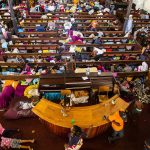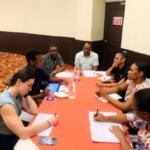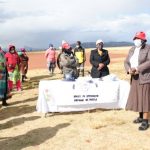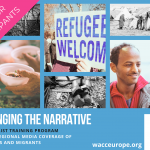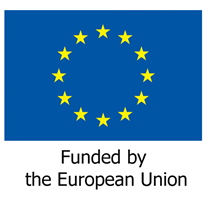 Johannesburg, South Africa – 22 – 23 March 2022 – UNODC Regional Office for Southern Africa convened a three-day Seminar for Prosecutors from the SADC Region to share experiences on prosecuting cases of Trafficking in Persons.
Johannesburg, South Africa – 22 – 23 March 2022 – UNODC Regional Office for Southern Africa convened a three-day Seminar for Prosecutors from the SADC Region to share experiences on prosecuting cases of Trafficking in Persons.
Up to 3 prosecutors from each of the SADC countries participated, physically and virtually.
The main aim of the litigation seminar was to build a healthy body of jurisprudence on TIP in the region and, consequently, to increase the number convictions obtained in the region on trafficking in persons.
Second, the meeting also acted to launch the UNODC Regional Trafficking in Persons Case Digest, which is a compilation and in-depth analysis of over 80 groundbreaking cases across the SADC Region. The Digest was developed over the entire 2021 from contributions of experts from the entire region and globally. It has references to key issues in the Region including labour exploitation, (harmful) cultural practices, sexual exploitation, types of evidence, evidential issues and challenges among many other themes and sub-topics.
The need for a Trafficking in Persons Case Digest emanates from the complexity of trafficking cases. Not only do these cases require proof by means of a number of elements, but each element, in itself, can require a constellation of circumstances to prove it. Moreover, the covert nature of the crime and the vulnerabilities of its victims make for typical evidential difficulties which can lead to wholesale exonerations, if not well understood. Thus, the Digest is expected to be of significant value to prosecutors and judicial officers in the region.
During the opening of the seminar, Hon. John Jeffery, Deputy Minister of Justice, observed the need for international cooperation noting that “Trafficking in Persons is a daunting crime to prosecute, as it is often a hidden crime that does not stop at the borders of a country”. He went on to say that “All SADC member states acknowledge that they are affected by Trafficking in Persons as source, transit and destination countries for victims of trafficking. This is demonstrated by the fact that most SADC member states are parties to the Palermo Protocol and are taking domestic measures to implement their international obligations in this regard and/or have specific legislation to prevent and combat Trafficking in Persons”
Mr. Ilias Chatzis., the Head of the UNODC Human Trafficking and Migrant Smuggling Section said that “one of the six change enablers of UNODC Strategic Vision for Africa 2030 is forging strong partnerships, hence it is in this pretext, that UNODC is convening the regional litigation seminar for prosecutors to strengthen bilateral and regional cooperation in combating trans-national organized crime”.
In the Southern African Development Community (SADC), one unique trend that stands out in the region is that convictions on human trafficking remain low. UNODC has over the years convened regional workshops on Combating Trafficking in Persons for Prosecutors, Judges and Magistrates in order to strengthen the prosecutions and adjudication of trafficking in persons cases. Furthermore, such workshops strengthen regional and cross regional collaboration on combating trans-national organized crime especially trafficking in persons and smuggling of migrants.
The workshop saw three days of robust discussions focusing on Trafficking in Persons cases where exploitation did not transpire; focusing on subtle means of control including family complicity; focusing on victim consent; focusing on weaknesses in victim behaviors and how courts address them as well as focusing on issues arising in regard to child trafficking were deliberated on and strategies to address such issues were elaborated on.
The prosecutors, whilst speaking on elements of different cases they have encountered, demonstrated the gravity of the crime that Trafficking in Persons is. The trauma and harm that the victims are put through. Above that, the dedication that the Criminal Justice Sector has, to combat Trafficking in Persons cases, based on the efforts they put in to ensure that the perpetrators are arrested and prosecuted, and victims rescued and rehabilitated.
The meeting was made possible thanks to technical and financial support of the US Government State Department to Combat Trafficking in Persons (JTIP) and the European Government under the framework of the Southern Africa Migration Management (SAMM) Project.

Panel Discussion: Malawi, Eswatini, Seychelles & Zimbabwe

Virtual participation: UNODC technical expert
 Français
Français
